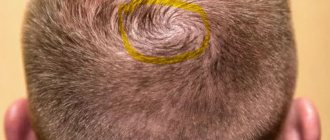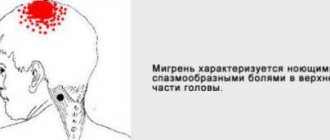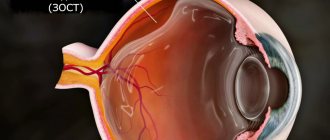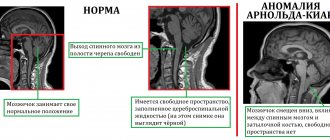Looking for the real reason
Exploding head syndrome is poorly understood, but there are various hypotheses regarding the nature of its occurrence.
Observation of patients during sleep allowed us to formulate a theory that the syndrome is associated with disturbances in the functioning of the brain. The disorder occurs as a result of disruption of the natural processes of inhibition and excitation that occur in the network formation.
Before entering the sleep state, various parts of the brain gradually turn off. At different stages of this process, auditory, motor, and visual neurons are switched off.
Also, explosions and flashes in the head can be caused by auditory neurons being activated instead of shutting down. This process can lead to sharp and loud auditory hallucinations.
Also, patients with this syndrome experience delayed reactions in the reticular formation (the area of the brain responsible for activating the cerebral cortex and reflexes). This suppresses alpha waves produced by the brain, which are responsible for falling asleep.
Possible causes of the disorder include:
- small seizures that affect the temporal lobe of the brain;
- sudden disturbances in the structure of the middle ear;
- stress and increased anxiety;
- sleep deprivation;
- hearing injury;
- withdrawal of antidepressants (selective serotonin reuptake inhibitors);
- withdrawal of benzodiazepines;
- chronic fatigue;
- other sleep disorders;
- disturbances in the functioning of the nervous system;
- excessive consumption of alcohol and drugs;
- mental disorders;
- chronic pathologies of internal organs.
Women are most susceptible to developing the disorder.
Previously, it was thought that the syndrome was characteristic of older people, but research conducted in 2014 at the University of Washington showed that the disorder is quite common among young people.
So, when surveying students, about 18% of them noted the presence of symptoms of the syndrome.
Causes
There are a number of factors, the manifestation of which contributes to the development of attacks with disturbed sleep.
Experts highlight the main ones:
- constant anxiety, chronic stress;
- epileptic activity is observed in the temporal part of the brain;
- discontinuation of medications after prolonged use, these can be benzodiazepines, antidepressants;
- pathological structural transformations in the part of the brain responsible for the perception of noise or in the middle ear;
- mental pathologies;
- night sleep disorder that bothers a person for a long time;
- drug and alcohol abuse.
Each individual case is subject to careful study by a specialist. A full examination of the patient is indicated, and if necessary, additional examination methods are prescribed.
Features of the clinical picture
During sleep or in the process of falling asleep, loud sounds, noises, flashes, and explosion sounds suddenly appear in the head area. In some cases, these sensations occur during the period of awakening.
Sound hallucinations are not accompanied by pain. Waking up from loud sounds occurs with a feeling of fear and is often accompanied by sleep paralysis.
During an attack, the following symptoms may appear:
- the sounds of a loud explosion that seems to tear your head apart, the sound of strings, the sound of a bursting balloon, the sounds of a bell, a scream, a knock, a shot;
- convulsions, muscle twitching;
- panic attack during an attack;
- sensation of bright flashes.
An attack of exploding head syndrome is quite short-lived and lasts no more than a few seconds. It can occur once during the night, or it can occur several attacks in one night. They can occur every night, once a week or month, or there may be only one episode of attack throughout life.
The sensations of an attack may make a person think that a cerebral hemorrhage or stroke has occurred.
Exploding head syndrome (“Boom!”)
Exploding head syndrome is a rare, unusual sleep disorder that has been described in considerable detail in the medical literature. The pathology was first described by the American physician Silas Ware Mitchell in 1876, when he examined two men who suffered from loud bells in their sleep or gun shots that woke them up.
This is actually not as rare a condition as it might seem. Bill Sharpless, an assistant professor of psychology at the University of Washington, conducted a survey of 211 college students and found that approximately 18% of respondents experienced this condition.
What is exploding head syndrome or what can explode in your head?
SVH occurs when sleep stages change. Exploding head syndrome is characterized by a strong noise or loud sound that a person experiences in their head or during sleep just as they are falling asleep. For some, the exploding attack occurred upon awakening.
People describe what is happening as a loud explosion in a dream, from which the head seemed to be torn into pieces, as if a balloon had burst in the head, as if the strings were being plucked in the head. It could be the sound of a shot, a knock on a door, a scream, a bell. Many people experience a flash in the head, muscle twitching, or a panic attack during noise. There is no pain in this case.
The sensation is very fleeting, lasts only a few seconds, and completely disappears upon full awakening.
The patient may experience attacks either once or in a series over one or several consecutive nights. For some, an explosion in the head occurs only once in their life (but is remembered for the rest of their lives), while for others, something can explode several times during the night. Usually after a series of attacks over a long period of time - up to several months - they do not recur.
Neurologists and psychiatrists classify the pathology as a type of parasomnia (the name for sleep disorders). Parasomnias refer to unwanted behavioral reactions that occur during sleep. Sometimes the syndrome manifests itself so clearly that a person is forced to seek medical help from a doctor, often with a suspicion of a vascular accident (stroke, etc.).
Should I see a doctor?
Usually, to determine for yourself whether you have this disease, it is enough to ask yourself 3 questions:
- At what time do symptoms occur? If right before falling asleep or even during sleep, then this indicates this syndrome.
- Is there any pain? If not, then this is also symptomatic.
- Do you wake up feeling anxious and afraid? If so, and a person wakes up with a feeling of anxiety, then we can say with a high degree of confidence that this is “exploding head” syndrome.
Usually, after a full, long rest or even a vacation, the symptoms disappear
It often happens that sharp sounds in a dream do not cause a person any inconvenience other than quickly waking up and then immediately falling asleep, and if you do not focus his attention on this problem, then the person may not remember that he has such phenomena
However, if the pathology worsens the quality of life, interferes with a good night's rest or causes stress, you should consult a doctor - first a neurologist to identify possible concomitant diseases and check the functioning of the vascular system of the brain, and then a specialist in the field of sleep - a somnologist.
Diagnosis and differentiation from other disorders
A detailed examination is often not necessary to identify exploding head syndrome. The diagnosis can be made by a neurologist or a somnologist (a specialist in the field of sleep disorders) after a conversation and medical history.
In case of significant sleep disturbances, a study such as polysomnography may be performed. A polysomnography study examines brain waves, breathing function, and heart rhythms during sleep. Also, during the procedure, various movements of the limbs during sleep are recorded.
Polysomnography can reveal a connection between the sensation of auditory hallucinations in the head and possible other sleep disorders.
In some cases, exploding head syndrome may be accompanied by headaches. Therefore, it is necessary to carry out differential diagnosis with other syndromes that are characterized by headache.
In case of difficulties in making an accurate diagnosis, differential diagnosis is carried out with epilepsy and organic pathologies of the brain. For this purpose, the following research methods are used:
- CT scan;
- Magnetic resonance imaging;
- transcranial Dopplerography of cerebral vessels;
- Ultrasound examination of the vessels that supply blood to the brain.
Signs of a strange disease
What surprises many researchers so much and how does this incomprehensible syndrome manifest itself? According to sick survivors of the attack, the disease manifests itself in this way: “It all starts with a noise, the volume of which gradually increases and is eventually interrupted by a loud and unpleasant explosion. “Afterwards, a flash of light appears before the eyes, similar to a spotlight beam directed at the face, accompanied by the hissing of electrical discharges.”
Doctors of the traditional school associate the occurrence of an unusual mental disorder with profound deviations in the sleep process. Due to nervousness, victims may hear loud roaring sounds, whistles, surf noise and pops reminiscent of shell explosions. Manifestations can occur both during wakefulness and during sleep.
At first, symptoms were often attributed to other diseases of the nervous system that could cause visual and auditory hallucinations. Subsequent tests refuted this assumption.
Health care
Exploding head syndrome is a fairly new phenomenon in medicine and there is no single accepted treatment regimen.
Drug therapy can be used to treat the syndrome. Patients are often prescribed the following medications:
- homeopathic and herbal medicines;
- antihypoxants;
- sleeping pills;
- tricyclic antidepressants.
If the syndrome causes other sleep disorders (for example, insomnia), then calcium antagonists are prescribed. In some cases, calcium channel blockers can lead to complete cessation of attacks of the syndrome, but most likely a decrease in the frequency of attacks.
In the treatment of this sleep disorder, it is possible to use physiotherapy methods: acupuncture, massage, electrosleep.
About treatment
It must be said right away that there is no single treatment scenario for this disease. Treatment of exploding head syndrome is carried out individually, when deciding which it is necessary to take into account the characteristics of the patient’s condition. In most cases, specialists resort to such groups of medications as:
- Sleeping pills, which are created on the basis of natural ingredients.
- Tricyclic antidepressants.
- Antioxidants.
- Drugs that improve blood circulation in the brain. They help normalize metabolic processes in neurons.
Psychotherapy can be used as treatment; it has a positive effect on the state of the body. This is because the feeling that your head is exploding can occur due to chronic stress. In any case, the problem requires turning to professionals. A neurologist and a somnologist can make a conclusion about whether the patient needs psychotherapy. The doctor will be able to identify the causes of the disease and select the optimal treatment methods. This may be drug or non-drug therapy.
It is not recommended to treat yourself, the fact is that side effects may occur. In particular, these are cases when medications are used or the disease begins to progress. It may happen that the disease leads to other sleep problems, in particular chronic insomnia. In this case, experts prescribe calcium analogues. It often happens that calcium blockers help to completely get rid of attacks or reduce their frequency. Also, with this illness, it is allowed to use massage, electrosleep and acupuncture.
What should you tell your doctor?
In order for the doctor to make the correct diagnosis and prescribe the correct treatment, you need to communicate the characteristics of your feelings and condition. To begin with, it’s worth talking about when the first symptoms of the disease appeared, namely the sensation of a loud sound in the head. It is important to tell how often attacks occur and what their duration is. The doctor will also need your medical history. Let your doctor know what medications you are currently taking.
If you have previously experienced any sleep disorders, you should report this to a specialist. You may know that your relatives have had similar sleep disorders. Your doctor may advise you to keep a sleep diary for two weeks. This will help the specialist consider your regimen in more detail and assess the situation.
Relapse Prevention
Recommendations for preventing recurrences of nighttime explosions in the head are quite simple and applicable to many sleep disorders:
- Normalize sleep patterns . Normally, sleep duration should be at least 6-8 hours.
- Reducing tension and stress levels . If it is impossible to eliminate these factors from everyday life, it is necessary to master techniques and methods of dealing with stress and relaxation. These methods include auto-training and yoga.
- Normalization of diet . It is not recommended to eat heavy foods before going to bed. Also during this period you should not drink strong tea, coffee, energy drinks, or eat sweet, salty or spicy foods.
- Active lifestyle and sports . Walking in the fresh air, cycling, fitness, and swimming will help normalize sleep.
- To refuse from bad habits . Drinking alcohol and smoking negatively affect the quality of sleep.
Is treatment important?
After numerous observations of patients, it was found that exploding head syndrome has no consequences. The disease rarely causes severe discomfort and is usually replaced by an almost instantaneous lapse into sleep. If you don’t think about this problem, but rather rest more often and avoid heavy stress on the mental system, then you can completely forget about the attacks.
But if the syndrome negatively affects night rest, prevents you from relaxing normally, or leads to panic attacks, it is very important to consult a doctor in time. First, it is important to consult a neurologist for a full examination and identify concomitant pathologies, and then contact a somnologist
To avoid possible sleep problems, it is best to prevent relapses in advance. To do this, the patient must normalize sleep patterns (at least 7-8 hours), reduce stress levels, improve diet, start leading an active lifestyle and get rid of bad habits that worsen health.








